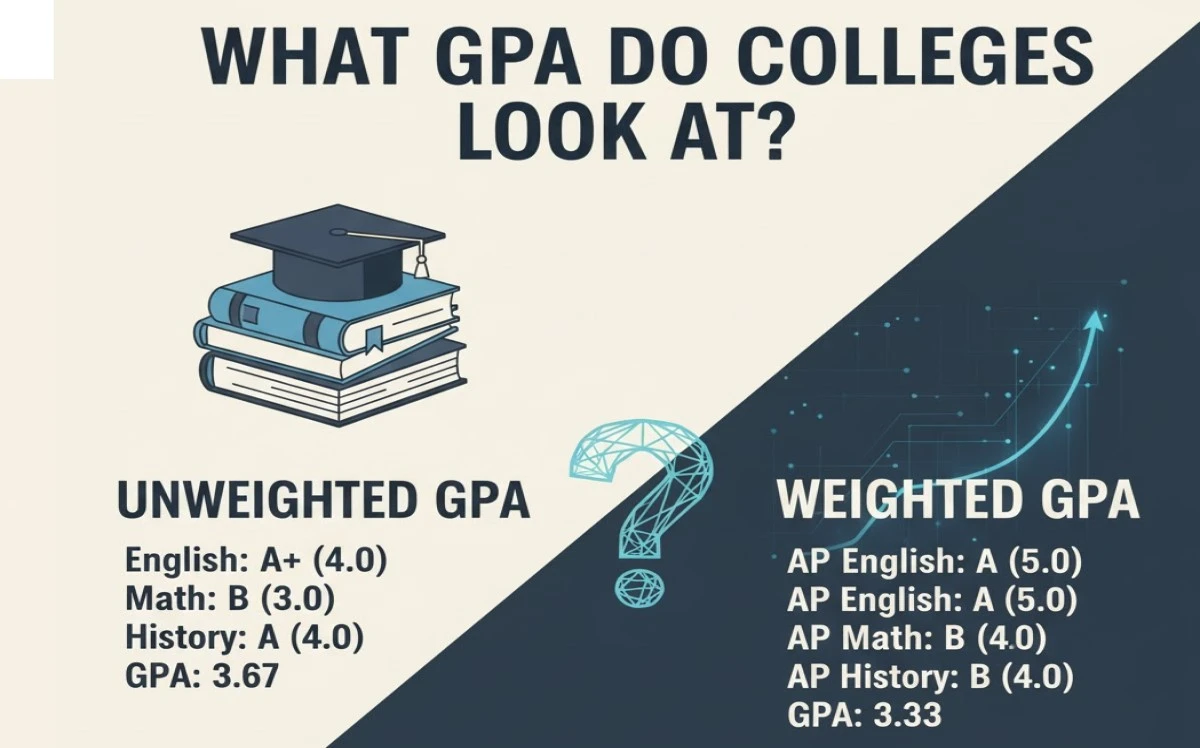When it comes to college admissions, high school GPA is one of the most important factors colleges consider. But students often ask: “What GPA do colleges look at?”, “Weighted or unweighted?”, or “What year matters most?” This guide will break down exactly what colleges see, how they evaluate it, and what you can do to improve your chances.
What GPA Do Colleges Look At?
Colleges primarily evaluate your high school GPA, which reflects your academic performance throughout high school. GPA stands for Grade Point Average and is calculated on a scale, usually 4.0 for unweighted GPAs. Some schools also report weighted GPAs, which give extra points for honors, AP, or IB classes.
Understanding what type of GPA colleges look at can help you plan your courses strategically and showcase your strengths.
Weighted vs. Unweighted GPA
Weighted GPA
Weighted GPA accounts for course difficulty. For example, an A in an AP class might be worth 5.0 instead of 4.0. This allows students taking challenging courses to earn higher GPAs.
Example:
- A in regular class = 4.0
- A in honors/AP class = 4.5–5.0
Some students wonder: “What do colleges look at, weighted or unweighted GPA?” The answer: top-tier colleges often see both, but they focus more on your performance relative to the difficulty of your courses.
Unweighted GPA
Unweighted GPA is simpler and ranges from 0–4.0, treating all classes equally. It’s easier to compare students across schools with different curricula.
Tip: Use both GPA types when applying. Colleges can assess your overall academic rigor and consistency.
What Year GPA Do Colleges Look At?
Another common question is: “What year do colleges look at for GPA?” While all years matter, junior year (11th grade) is often the most critical.
- Freshman and sophomore years: Build a solid foundation. Colleges notice upward trends.
- Junior year: Most important for admissions decisions. Colleges weigh grades heavily because these classes are often the most challenging.
- Senior year: Grades matter, but colleges usually review mid-year transcripts to ensure continued strong performance.
If you’re curious: “What year GPA do colleges look at?”, think of it as a snapshot of your academic trajectory, with junior year being the highlight.
What Grades Do Colleges Look At for GPA?
Colleges pay close attention to grades in core subjects like math, science, English, and social studies. Electives can help, but core academic performance carries the most weight.
- Honors, AP, and IB classes: Show rigor and can boost your weighted GPA.
- Consistency: Maintaining high grades across all years signals reliability and work ethic.
GPA Considerations for Transfer Students
If you are transferring, you might wonder: “What GPA do colleges look at for transfers?” Colleges focus on your college-level GPA, relevant coursework, and completed credits. They evaluate whether you’re prepared to succeed at the new institution.
What GPA Do Colleges Look At When You Apply?
Average GPA expectations vary by college selectivity:
- Highly selective colleges: 3.7–4.0 unweighted (often 4.0+ weighted)
- Moderately selective colleges: 3.0–3.7 unweighted
- Less selective colleges: 2.5–3.0 unweighted
Remember, GPA isn’t everything. Colleges also review extracurriculars, essays, and letters of recommendation.
Tips to Improve Your College GPA Profile
- Take challenging courses: Honors, AP, or IB classes can increase your weighted GPA.
- Stay consistent: Aim for steady improvement across all years.
- Use GPA tools: A CGPA Calculator helps you track your GPA and plan your academic path.
- Focus on core subjects: They weigh more in admissions decisions.
Conclusion
Understanding what GPA colleges look at helps you make informed decisions about courses and study habits. Focus on maintaining strong grades in core subjects, challenging yourself with advanced courses, and monitoring your progress with tools like the CGPA Calculator.
Remember, colleges consider weighted and unweighted GPA, the most critical years, and your overall trajectory. By planning wisely, you can maximize your GPA profile and increase your chances of acceptance.

